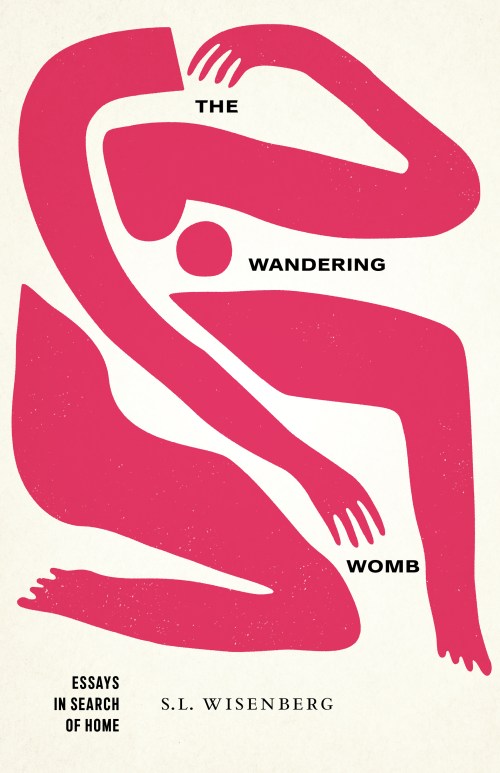[ad_1]
The following excerpt is from S.L. Wisenberg’s The Wandering Womb: Essays in Search of Home. Spanning years and continents, this new collection follows Wisenberg as she combs through history books and family records in her search for home and meaning.
S.L. Wisenberg is editor of Another Chicago Magazine and author of the fiction collection, The Sweetheart Is In, and two nonfiction books, Holocaust Girls: History, Memory, and Other Obsessions and The Adventures of Cancer Bitch. The recipient of fellowships from the National Endowment for the Humanities, Holocaust Education Foundation, and the Illinois Arts Council, Wisenberg works as a writing coach, editor, and creative writing instructor in Chicago.

“FRENCH YOGA“
Her eyes are deep and dark, and at the end of each class she says softly (en français) that she hopes that in the coming week we will have peace in what we see, peace in what we say, peace in our hearts (moving her hands from prayer position, to les yeux to la bouche to le coeur). Once she spent the first ten minutes talking about the EU and how Europe does not understand how to integrate the Arabs. I wanted the yoga to start but I also wanted to keep hearing progressive opinions in French. She was born in Morocco and is a secular Muslim and dances with a Chicago troupe. She teaches dancing to kids in a housing project after school and in the summer. She is beautiful like a Mediterranean woman in a travel poster. You would believe it if she told you that in some other country she was a movie star.
The instruction is in French, and she alternates between naming the positions in Sanskrit and French, and when she thinks we don’t understand she’ll repeat in English. We do le chien en bas (downward-facing dog), and also upward dog or le chien en haut, we collapse into the position of l’enfant, we stand in tadasana, squat in la grenouille, balance and stretch out our arms in l’arbre, or tree. Respire, expire, she directs us, distribute your weight between les phalanges of your fingers and les talons of your feet. Sometimes we take deep ujjayi breaths, where you vibrate the back of your palate like a snorer. There is le triangle and la chaise. At the end we lie on our back in savasana, corpse pose, le cadavre, palms up, legs spread in a V, eyes closed, relaxing while concentrating on our breaths.
Once she referred to savasana as what sounded like la position Maccabee and I continued to lie in the pose silently and wonder, Maccabee? Like Judah Maccabee? Relax the body, make your limbs heavy, but Maccabee as in Chanukah? After class I asked her about the word and she said it was another name for corpse. I couldn’t figure out why the French would name a corpse after a Jewish hero. Must be anti-Semitic, I said to myself. (I do not mean our teacher. I mean the French.) You would think, if anything, one of the warrior poses would be named for Judah Maccabee. Those poses are ripe for naming; in English they’re merely Warrior I, II and III.
I looked up la macchabée. It’s a casual word, slang but in general use, the equivalent of “a stiff,” often referring to the body of a person who has drowned. Thus, one of the Goncourt brothers wrote in his journal in 1885 of having dinner with Guy de Maupassant, who spoke a long time about poking around in the Seine and looking at les macchabées because their original ugliness was covered up. And Blaise Cendrars wrote (in French) in 1948, “When I’ve had enough of… the macchabées in the [medical] amphitheaters, the sick people at the hospital…”
A French etymological dictionary says the word is probably an allusion to people in the danse macabre, which itself was named after the seven Maccabee brothers, who died, together.
In Sunday school we learned of Judah Maccabee, great leader against the occupying Greeks, his name meaning “hammer,” who led the fight for Jewish independence and cleaned up the temple after it was defiled—altars destroyed, pigs let in to run through. He relit the temple lamp with oil only enough for a day or two, and it burned for eight days and thus we commemorate this miracle at Chanukah.
We did not learn that after he won that battle, he lost the war.
And in that losing, the seven brothers were killed and became Jewish martyrs. After that, they (or seven anonymous bodies who happened to be martyred around the same time, according to some sources) were adopted as Christian martyrs. “As martyrs took a more prominent role in the beliefs and practices of Christians, and Christians gained Imperial power, Rabbinic leaders ceded claim to the Maccabean martyrs and were forced to relinquish control of the Maccabean shrine,” rabbi and scholar Shira Lander writes. In other words, the rabbis weren’t so enamored of the Maccabees, who eventually capitulated to the Greeks, and the Christians wanted more martyrs.
*
I relax into the pose of la macchabée. At peace like a martyr who died for his cause. Prepare for your death by lying down like a corpse. Prepare for your martyrdom by believing in your cause. Have confidence. “Ride your bike with confidence,” says the safety booklet from the city. The answer to all. To walking on streets at night by yourself as a woman, keys between fingers, ready to counterattack. Relax into the Maccabee pose, the pose of the Jews who became Christian after their deaths. They died for their religion and were converted posthumously anyway. The Christians claimed Jesus, son of Joseph, for themselves and called him Christ; they went to Auschwitz and set up a convent there. I am lying on my sticky mat inside a tiny slice of France inside Chicago, palms relaxed, outward, holding nothing. Not grasping. We are all corpses now, letting go. Nothing is ours except for our breathing, which is life flowing through us. In the past hour we have greeted the sun, stood as warriors; we have been frogs and dogs and rabbits and camels, monkeys and happy babies, and then les cadavres. And after savasana, we slowly come back to ourselves and roll to the right (so that the heart is open, exposed), in la position du fœtus and then push ourselves up and around to sit up straight, crossing our legs as tailors do. We say namaste—meaning, “hello,” but interpreted lately, and by some, lamentably, as “That which is sacred in me recognizes that which is sacred in you.” We return ourselves to ourselves, we put on more clothes, we walk out the door, into America.
Excerpted from The Wandering Womb by S.L. Wisenberg copyright © 2023 by University of Massachusetts Press.

NONFICTION
The Wandering Womb: Essays in Search of Home
By S.L. Wisenberg
University of Massachusetts Press
Published March 31, 2023

[ad_2]
Source link

